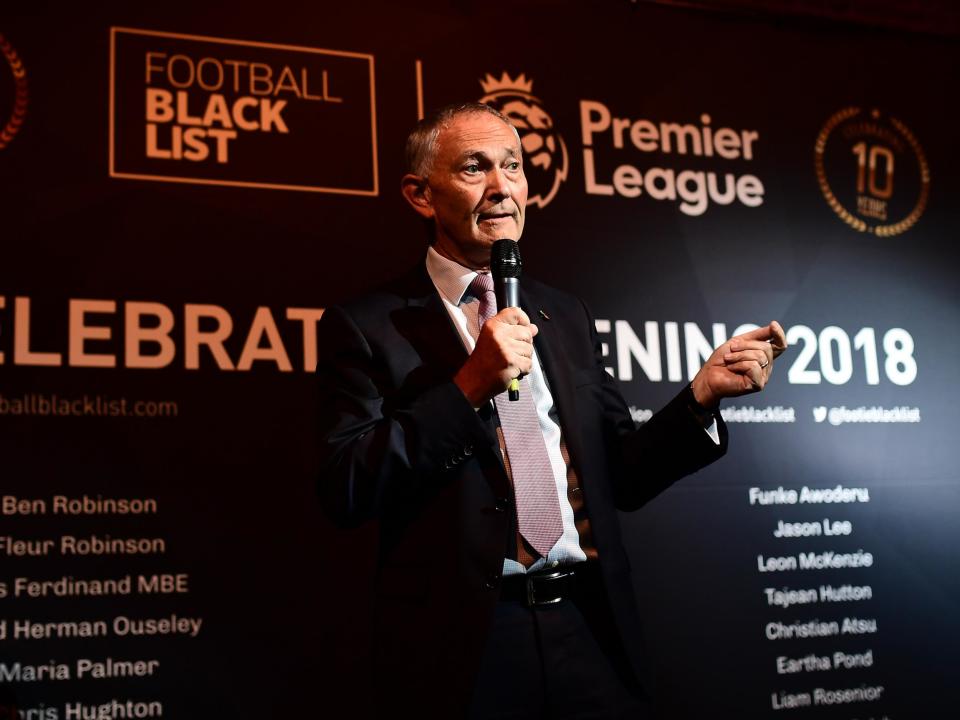Don’t be surprised by the £5m ‘golden goodbye’ to the Premier League’s boss – it’s business as usual
Christmas has come early for Richard Scudamore. And Santa has been exceedingly generous.
The Premier League has announced that it will award its outgoing executive chairman £5m in “recognition of his outstanding work”. Not everyone is filled with seasonal goodwill at the news, to put it gently. The Football Supporters’ Federation, in particular, are playing Grinch.
“Fans strongly oppose the ‘golden handshake’ and we urge clubs not to make a decision which is hugely unpopular with supporters,” it complained last week.
But actually the supporters’ group arguably has its terminology slightly wrong. For this isn’t so much a “golden handshake” as a “golden goodbye” – a perk for past services. Golden goodbyes present a bit of a problem for the usual justifiers of high corporate remuneration. The conventional argument in favour of showering bosses with humongous bonuses is that it incentivises them to do a good job.
One could fill a book explaining why this is analytically flawed and, generally, self-serving tosh. But it’s impossible to make this incentive argument, at least with a straight face, when the boss getting showered in cash is departing and, moreover, did not know about it in advance. Scudamore was reported to be “surprised and embarrassed” about the idea, but seems to have got over it.
The basic point is that the £5m, as a matter of logic, can’t incentivise Scudamore to work any harder because he won’t be there.
Scudamore will, apparently, continue to “advise” the league. But this raises the question: why not continue to pay him as an adviser? And the clubs are really not trying very hard to conceal the truth, which is that this is a reward for past performance, not one conditioned on future hard work.
“He deserves everything he gets,” glowed the West Ham co-chair David Gold, fastening on his metaphorical Santa cap.
The Premier League has, predictably, been highlighting all those blockbuster broadcast deals Scudamore oversaw while he was in charge as context for their generosity.
Three-year television rights when Scudamore took over in 1999 were worth £670m. Now they’re well north of £5bn. Explosive growth, unquestionably. But how much of that was personally due to Scudamore, rather than the environment in which he worked?
Should we credit Scudamore for the fact that BT decided to enter a bidding war with Sky for football rights in 2013 because it saw live football as a means of luring customers over to its broadband services?
And, in any case, is that really the main criteria we should use to judge his tenure? It’s an irony that, when it comes to sports, the Americans are much less blinded by primitive free market ideology than we are here in the UK.
American football has aggregate salary caps for players and a redistributive draft system – where the weakest teams have first pick of the best young talents in the following season – to ensure some degree of competitive balance and to prevent the total domination of a small number of franchises with huge fan bases.
Any suggestion that the Premier League should implement something similar would soon be denounced as revolutionary socialism. But the American sporting authorities understand that top-line revenues for a league are not everything.
To its credit, the Premier League is more financially egalitarian than some other European football leagues when it comes to the division of TV money. The inequality in Spain’s La Liga – where Barcelona and Real Madrid hoover up the vast majority of broadcasting revenues due to their popularity – is grotesque. Things have slightly improved recently, though the Spanish system remains grossly imbalanced.
But the Premier League’s egalitarianism only stretches so far. The “5 per cent of revenues” promise for redistribution to grassroots football made in 1999, whatever the protestations of the league, has not been met. As the football writer David Conn notes, the true figure is closer to 3.5 per cent.
And there’s been no moves to rein in the richest clubs, to look after the broader interests of the league and football itself. A cache of documents leaked earlier this month led to claims that Manchester City, owned by Sheikh Mansour of Abu Dhabi, used financial skulduggery to get around the Uefa rules on clubs having to match their spending on players broadly with revenues.
Uefa has said it could re-open its previous investigation into the club’s spending in light of the new information. But there has not been a peep from Scudamore about that – even though such rule-breaking, if it occurred, would be just as potentially damaging to the competitive balance of the Premier League as to pan-European competitions.
Nor has there been a peep from him, over the years, about any of the rogues who have, at various times, been able to take control of Premier League clubs. They’ve all been “fit and proper” as far as Scudamore has been concerned.
He who pays the piper calls the tune. And in the Premier League it is the big clubs who have called the tune ever since its foundation. The piper has been very well remunerated for his loyal and steadfast service to their narrow interests. And now he’s getting a golden goodbye.

 Yahoo News
Yahoo News 

